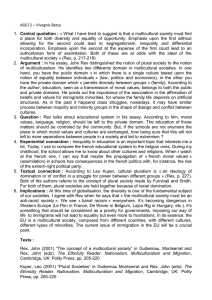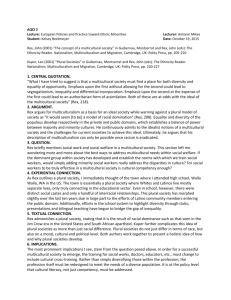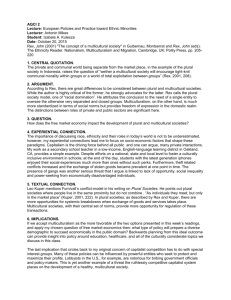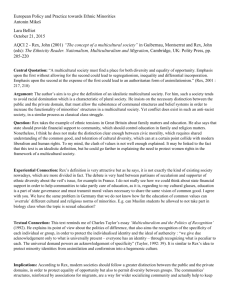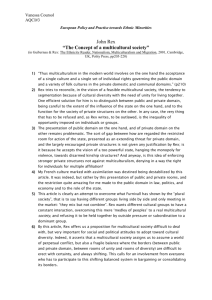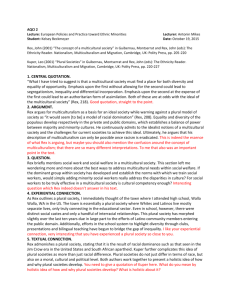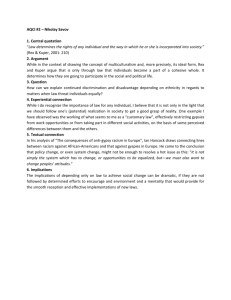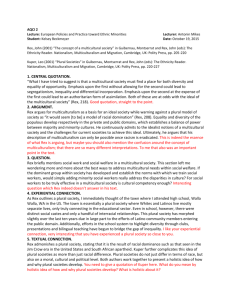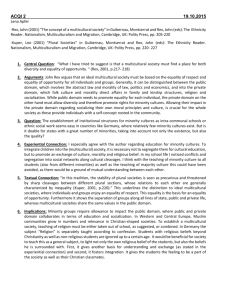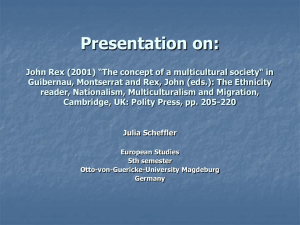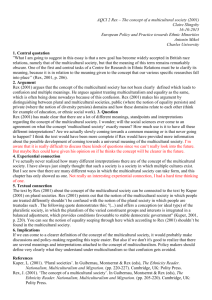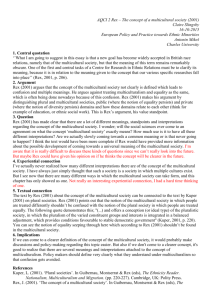AQCI 2 – Vivegnis Betsy
advertisement
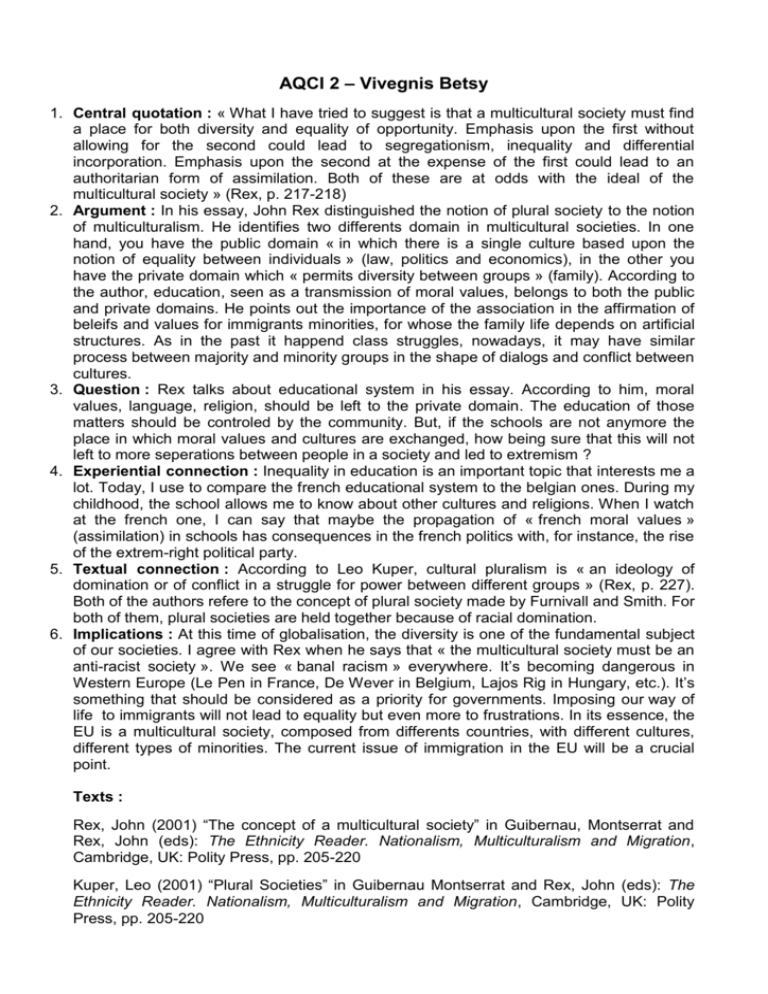
AQCI 2 – Vivegnis Betsy 1. Central quotation : « What I have tried to suggest is that a multicultural society must find a place for both diversity and equality of opportunity. Emphasis upon the first without allowing for the second could lead to segregationism, inequality and differential incorporation. Emphasis upon the second at the expense of the first could lead to an authoritarian form of assimilation. Both of these are at odds with the ideal of the multicultural society » (Rex, p. 217-218) 2. Argument : In his essay, John Rex distinguished the notion of plural society to the notion of multiculturalism. He identifies two differents domain in multicultural societies. In one hand, you have the public domain « in which there is a single culture based upon the notion of equality between individuals » (law, politics and economics), in the other you have the private domain which « permits diversity between groups » (family). According to the author, education, seen as a transmission of moral values, belongs to both the public and private domains. He points out the importance of the association in the affirmation of beleifs and values for immigrants minorities, for whose the family life depends on artificial structures. As in the past it happend class struggles, nowadays, it may have similar process between majority and minority groups in the shape of dialogs and conflict between cultures. 3. Question : Rex talks about educational system in his essay. According to him, moral values, language, religion, should be left to the private domain. The education of those matters should be controled by the community. But, if the schools are not anymore the place in which moral values and cultures are exchanged, how being sure that this will not left to more seperations between people in a society and led to extremism ? 4. Experiential connection : Inequality in education is an important topic that interests me a lot. Today, I use to compare the french educational system to the belgian ones. During my childhood, the school allows me to know about other cultures and religions. When I watch at the french one, I can say that maybe the propagation of « french moral values » (assimilation) in schools has consequences in the french politics with, for instance, the rise of the extrem-right political party. 5. Textual connection : According to Leo Kuper, cultural pluralism is « an ideology of domination or of conflict in a struggle for power between different groups » (Rex, p. 227). Both of the authors refere to the concept of plural society made by Furnivall and Smith. For both of them, plural societies are held together because of racial domination. 6. Implications : At this time of globalisation, the diversity is one of the fundamental subject of our societies. I agree with Rex when he says that « the multicultural society must be an anti-racist society ». We see « banal racism » everywhere. It’s becoming dangerous in Western Europe (Le Pen in France, De Wever in Belgium, Lajos Rig in Hungary, etc.). It’s something that should be considered as a priority for governments. Imposing our way of life to immigrants will not lead to equality but even more to frustrations. In its essence, the EU is a multicultural society, composed from differents countries, with different cultures, different types of minorities. The current issue of immigration in the EU will be a crucial point. Texts : Rex, John (2001) “The concept of a multicultural society” in Guibernau, Montserrat and Rex, John (eds): The Ethnicity Reader. Nationalism, Multiculturalism and Migration, Cambridge, UK: Polity Press, pp. 205-220 Kuper, Leo (2001) “Plural Societies” in Guibernau Montserrat and Rex, John (eds): The Ethnicity Reader. Nationalism, Multiculturalism and Migration, Cambridge, UK: Polity Press, pp. 205-220 Department of Public and Social Policy, Faculty of Social Sciences, Charles University AQCI ASSESSMENT FORM Student’s name: Name of assessor: Date: Essay title: Excel lent 1) Is the chosen quotation central to the author’s argument? 2) Has the main argument been fully understood (including its ‘for’ and ‘against’ sides, if applicable)? 3a) Is the question raised important/relevant/interesting? 3b) Has this question not been fully answered in the text? 4) Is the experiential connection relevant/interesting? 5a) Is the textual connection relevant/interesting? 5b) Has it been cited properly? 5c) Has it been adequately explained how the present text's argument contrasts with, contradicts, confirms, clarifies, or elaborates the other text's argument or point? 6) Have the implications been well understood, can they have a practical impact for policy making? 7) Expression/Presentation a) Are the style, grammar and general use of English adequate? b) Is the AQCI professionally presented? Essay grade: Further comments: Go od Aver age Po or Not accept able Comments
